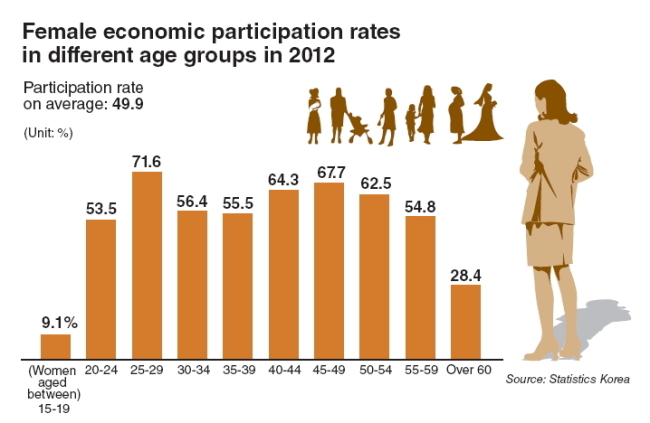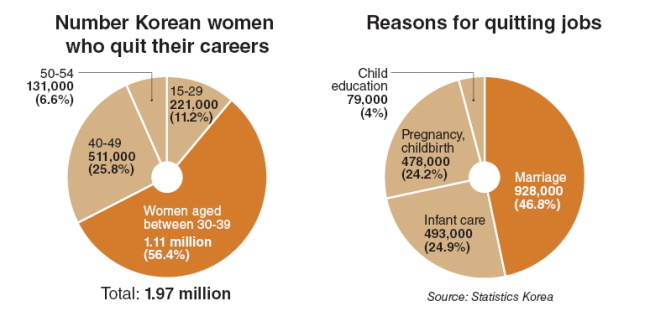Work and life balance tall order for Korean working moms
Policymakers confront rigid labor structure, deep-rooted tradition
By Korea HeraldPublished : Feb. 2, 2014 - 20:22

Lee So-young, a 35-year-old mother of two daughters, was a straight-A student at college.
“I was quite ambitious at that time,” she said in her apartment in Mokdong, southwestern Seoul, recalling graduating summa cum laude at a university in the city.
“I thought I would become a successful career woman. … A stay-at-home mom was the last thing I wanted to be,” she said.
Her career path was on track as a marketing deputy manager at an IT firm in Seoul. But everything changed when she had her first child.
“It was nearly impossible for me both physically and mentally to compete with male colleagues during pregnancy in a business environment that gives more promotion opportunities for those who work longer and are good at entertaining bosses at company dinners,” she said.
Going back to work after having the baby was not easy. Lee was exhausted after competing with her colleagues for promotion during the day and taking care of the baby at night. Three months later, Lee called it quits.
“I realized that I couldn’t keep up with the long-hours working culture anymore while leaving my baby behind,” she said. “The funny thing was that no one at work suggested I think twice. They acted as if they knew that I was going to leave the office soon.”
Lee is one of millions of Korean women who have left the workplace mainly because of difficulties in balancing life and work. They are described in Korea as “career-discontinued women.”
The term was coined as the exodus of professional women in this age group ― women in their 30s ― is bigger than other countries, experts say, and the number of moms returning to work is low.

A recent study compiled by Statistics Korea in 2012 showed that more than 70 percent of women aged between 25 and 29 had entered the job market. The female economic participation rate, however, dropped to 55 percent when women reached their 30s, when they usually start a family. Marriage, pregnancy and infant care were major reasons for them quitting jobs, the study added. The rate slightly moved up among women in their 40s and 50s but not to the level of 20-somethings. For many women, the interruption to their careers lasts a lifetime.
Park’s initiative
The issue of women having difficulties in balancing work and family life attracted public attention in January, when President Park Geun-hye, the nation’s first female leader, urged Cabinet members to seek ways to expand economic opportunities for women.
“Making a Korea that does not have a woman suffering from an interruption of her career due to child bearing and rearing should become our goal,” she said at a Cabinet meeting held in January. She ordered ministers to come up with new ideas to halt the exodus of women from the workplace and help those re-entering work, labeling the issue as an important state agenda.
“We should become more determined to make the country a place where women can work with their minds at ease,” she said.
Park’s initiative came amid growing concerns about the future of the Korean workforce.
The early departure of female workforce has been cited as a major problem in lowering the country’s overall rate of female participation in the economy. According to OECD reports, the economic participation rate of Korean women was 55.2 percent, which is lower than that of Japan and the United States with 63.4 percent and 67.6 percent, respectively.
Korea, struggling with low birthrates, has entered an aging society at a faster pace than any other OECD country. Korea’s fertility rate also remains low, at 1.3 children per woman, as of 2012. Korea’s working-aged population is expected to decline starting in 2018.
Under her direction, the government is seeking to increase the number of jobs that allow women to choose their working hours, increase related facilities and encourage fathers to engage in child rearing. The government is considering incentives to companies that introduce flexible working hours and promote a family-friendly culture.
The Ministry of Gender Equality, led by Minister Cho Yoon-sun, plans to announce a set of policies this month to open up job opportunities for mothers and create a family-friendly culture. The ministry also plans to expand the number of re-employment support centers to 120. Cho is one of Park’s close aides who served as spokeswoman for her presidential campaign team.
Starting this year, the Ministry of Health and Welfare offers free childcare programs for parents with children under age 5, regardless of their income level. The government fully pays tuitions for those who attends state-authorized day care centers or offers child benefits to those who raise their kids at home or choose to send them to private institutions.
Moves for change
Park’s drive to support women has had a considerable impact, experts say.
Creating 1.65 million jobs for women and raising the female economic participation rate to 61.9 percent, during her five-year term, was one of Park’s presidential pledges. Her term ends in February 2018.
Park taking the nation’s top post has a positive message for Korean women who want to break the glass ceiling and companies opening more management-level positions for women.
“Momentum is building up for change at a fast pace. Companies are setting up task forces to study the efficacy of adopting flexible working hours and ways to recruit women on career break,” said Kim Jong-soog, researcher at the Center for Women’s Labor and Human Resources Development Policy under the Korean Women’s Development Institute.
Starbucks Coffee Korea, a global coffee-chain operated by Shinsegae Group here, is one company making efforts to increase opportunities for women who have become stay-at-home moms but wish to return to work. The company has started the “Return Mom Project” a year ago which aims at recruiting former female employees on a part-time basis.
“I felt bored at home as my kid started to attend day care,” said Lee Jin-a, an assistant store manager at a Starbucks branch near Kkachisan Subway Station, who returned to work through the project.
The 36-year-old mother of a 3-year-old son, works four hours a day, from 10:30 a.m. to 3:30 a.m., which allows her to walk her son to the day care center and pick him up after work in the afternoon.
“I think it is a win-win project. I could concentrate more for four straight hours at work and I don’t have to worry about being late for my son,” she said.
Lee said that although she works part time, she is classified as a regular worker with the same benefits as full-time workers.
Lingering problems
Like Lee, female workers with children should be given varied work options so that they can develop their careers, said Kim of KWDI. But the current labor market has a long way to go in this regard, as the country’s long working hours and work culture puts little value on family life and heavy role of women in work and life.
“Not only the Park government, previous administrations also introduced a series of policies to tackle the growing number of career discontinued women. It didn’t work because of this unique culture,” said Min Moo-suk, director at equality and HRD policy department in KWDI.
“This kind of work culture makes it nearly impossible to work. If they don’t fit into the culture, women are regarded as failures, and are pressured to quit,” she said.
Despite the improved status of women in Korea, Korean women still face the daunting task of balancing their work and life, partly because of the longstanding expectations that women are more responsible for raising children than men, she added.
Health Minister Moon Hyung-pyo also stressed the need to change the role of men and promote gender equality at home.
“In order to help women to return to work, I think the role of husbands has to change at home,” he said in a recent news conference held in Seoul, quoting a recent study that Korean men contribute about 30 minutes of housework a week, less than the one hour contributed by Japanese men.
The social perception toward women workers on child care leave has to change too, he said. Korea offers one year of leave for both working parents. But it is hard to take time off from work as it affects performance evaluations and increases the burden on their colleagues because companies don’t usually have an alternative workforce to draw on as cover for them.
The government should encourage women not to quit their jobs in consideration of the huge social economic cost. Citing her recent study, Kim of KWDI said that the departure of female workforce led to a loss of 128 trillion won in social economic loss, which accounted for about 14.2 percent of the country’s gross domestic product in 2008. Kim incorporated the education cost spent by women who graduated four-year universities and added the cost of them trading their work opportunities with families.
“Korean women are highly educated and have great potential. If they are forced to choose family over work, it would mean a great loss to the country,” Kim said.
By Cho Chung-un (christory@heraldcorp.com)
-
Articles by Korea Herald



















![[Today’s K-pop] Treasure to publish magazine for debut anniversary](http://res.heraldm.com/phpwas/restmb_idxmake.php?idx=642&simg=/content/image/2024/07/26/20240726050551_0.jpg&u=)